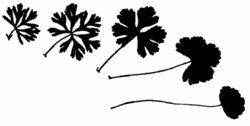Can we think like a plant grows?

I have no idea when or why I signed up for a Goethean Science newsletter, but Steve Talbott @ The Nature Institute has some great articles. Just read: Can We Learn to Think Like a Plant?.
"Mere sameness is not unity, and it cannot give us
movement. This is why a science based on abstraction, whereby we abstract
from things their sameness -- what they have in common -- cannot deal with
the various sorts of dynamic unity we find in the world's phenomena."
I understand how all this abstraction feels like new-age-occult-nonsense-talk to "hard" scientists, but the whole approach seems to have validity to a "i had blunt head trauma to my left brain" poster child like me. Feels similar to the brain's use of invariant representation and patterns from On Intelligence. And it sounds like some of Goethe's theories have had a resurgence due to some quantum physics findings. Still, I feel awkward with a "Be the plant" science mantra.
"It seems to be a mere image held in our minds. It is more pictorial and imaginative than logical and computational. It does not readily lend itself to the action of gears or levers or transistors. To equate it with any particular physical object is, in fact, to lose it. Can such a pictorial idea manifesting in our consciousness contribute to a genuine understanding of the world?
...Within human consciousness we discover a language for understanding the world. If this were not so, we could only stare blankly at our surroundings. What scientists need to realize is that our conscious (and unconscious) interior is vastly richer than the contentless abstractions playing over the convoluted surface of our brains. We are creatures of imagination, of heart-felt feeling, and of will raying out through our muscles and bones. And to the degree we must call on the full powers of this inner language in order to comprehend, for example, the leaves successively gestured forth along the stem of a buttercup -- to the degree this language makes the world intelligible -- we must acknowledge that the language speaks truly. That is, it reveals the world, which is to say that what speaks in us speaks also in the world."
That all feels right, but I don't see how it is contrast with the dissection of an idea. Sure the idea "dies" in the process, but narratives or gestures are pulled from snapshots all the time. Don't see how "qualitative science" differs really. I do wish "quantitative science" focused on language more.
Here's some Goethean Car Manufacturing

0 Comments:
Post a Comment
<< Home